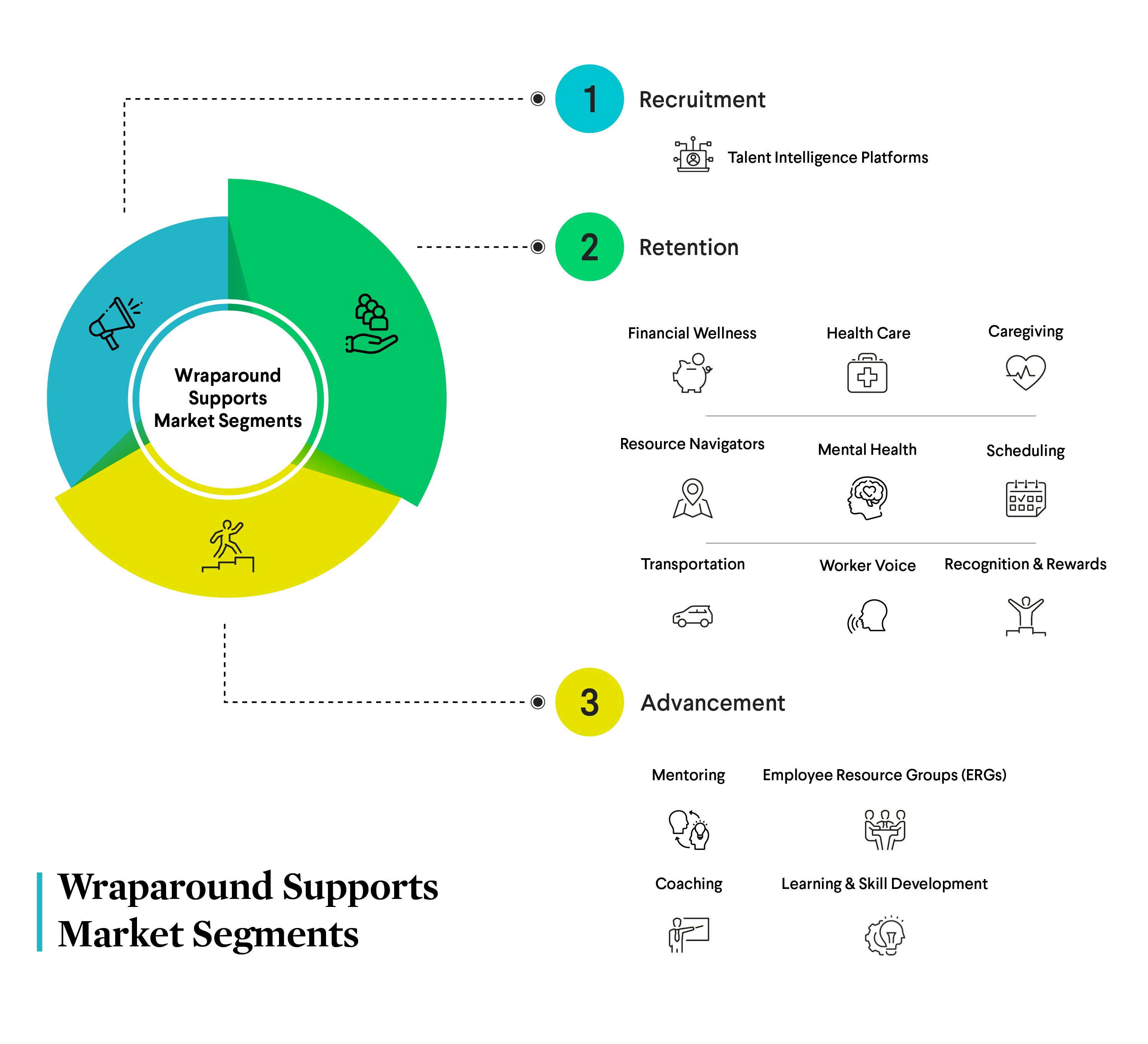Innovative Wraparound Support Solutions That Help Workers Succeed
Mapping the Market
How we segmented and categorized the wraparound support solutions market
Market Segmentation
Through our research, we gained clearer insights into how offering wraparound supports enables employers to improve their talent management practices and expand economic advancement opportunities for Black workers. Based on what we learned, we divided the market into three key categories: recruitment, retention, and advancement.
As we reviewed the array of products, services, and resources in this marketplace, we assigned the offerings to categories based on the way they support workers in their career journeys and drive improvements in business outcomes for employers. In some cases, solutions could fall into more than one category. For example, in shift-based industries, an app that improves scheduling flexibility could boost both recruiting and retention. Having the flexibility to juggle work and personal responsibilities is important to today’s employees. Therefore, tools and services that give workers more job flexibility help attract new workers and improve job satisfaction for all employees—and improvements in job satisfaction lead to improvements in retention rates.
Within the segments of recruitment, retention, and advancement, we identified subsegments of products and services that address aspects of workers’ lives, both inside and outside of work, that significantly impact their engagement and performance on the job. The sub-segments include things like talent intelligence platforms, health care solutions, and mentoring tools—all of which play key roles in ensuring that Black employees can bring all of their skills and expertise to their work and take advantage of opportunities for economic advancement.


How We Selected Companies to Highlight
We started with a list of more than 2,000 companies that offer wraparound supports that impact recruitment, retention, and advancement of employees, with a particular focus on supporting Black workers.
The list included technologies and solutions designed to improve access to the social determinants of work. Examples include shift scheduling tools and platforms designed to improve access to child care, health care, mental health services, housing, and transportation. We also reviewed companies whose offerings are designed to expand access to quality job opportunities and help workers acquire new skills, expand their networks, and build professional social capital.
To assess the impact these offerings could have on Black workers, we refined our evaluation criteria based on strategies for accelerating Black economic advancement highlighted in “Achieving Black Economic Equity,” the JFF Center for Racial Economic Equity’s call to action. This review process enhanced our understanding of the market and enabled us to focus on an increasingly narrow list of companies.
We specifically focused on companies that show promise for impact, equity, and scale in the following ways:
-
Impact:The solution supports or has the potential to support Black workers or members of populations that face similar barriers limiting their access to employment and education.
-
Equity:The solution is designed to address systemic barriers Black people face in the workplace or has the potential to mitigate the impacts of workplace inequities.
-
Scale:The solution has the potential to be effective on a large scale and thereby benefit large numbers of people, or it could serve as a model for other solutions.

-
Segment 1: Recruitment
The Recruitment segment of the market includes solutions designed to expand access to jobs and economic opportunities for a diverse range of talent, including Black workers.
These offerings include recruiting platforms designed to mitigate bias by screening candidates based on their skills, previous experiences, and career interests, not primarily on their academic achievements. They also include platforms that help employers recruit from more diverse populations of workers than they may have targeted in the past—an approach that can help a company build a brand identity as an organization that values DEI. These platforms can deliver business benefits by streamlining the recruiting process and enabling companies to choose and hire candidates more quickly; they can also make it easier to find candidates with the exact skills a job requires.
Technology-driven recruitment tools have the potential to enhance the employment and career advancement opportunities available to Black workers (and all employees) by opening up new career pathways for members of populations that have long been underrepresented in quality jobs. These systems also enable employers to gather a rich array of data about candidates and employees. The data can help them improve retention rates by identifying supports and services they can provide to help enable workers to succeed on the job.
Recruitment tools tailored to benefit Black workers are capable of doing things like masking information that might inadvertently lead to bias against an applicant and creating unbiased job descriptions. They may also include salary bias alerts to promote fairness and equity in the hiring process and use application programming interfaces (API) to match workers from populations that are underrepresented in quality jobs to roles that once may have been inaccessible to them based on traditional criteria like degree requirements.
An Opportunity
AI and machine learning have the potential to revolutionize how employers find candidates and evaluate whether their skills align with job requirements, opening up new opportunities for untapped or overlooked talent. Moreover, AI can be leveraged to analyze aggregated worker data that preserves the privacy of individuals, enabling employers to identify previously overlooked gaps in their practices that hinder efforts to build more diverse and inclusive workplaces.
A Challenge
Resistance to changing ingrained and longstanding beliefs and practices related to hiring could inhibit the adoption of innovative recruiting and talent-sourcing tools.
Subsegment
Talent Intelligence Platforms: Typically powered by AI, talent intelligence platforms are data-driven systems that employers can use to analyze workers’ skills in order to identify untapped sources of talent, match workers to jobs, and manage succession planning processes. They use data from job applications, resumes, and other sources to offer insights into workers’ capabilities and achievements, along with any needs workers may have for training and development or other supports. These insights help employers to navigate a rapidly evolving talent market by giving them information they can use to quickly—and equitably—connect workers of all backgrounds to suitable job opportunities.

-
Segment 2: Retention
Retention solutions support the post-recruitment experiences of employees.
They provide access to holistic supports to ensure that workers can meet all of their needs for essential resources, including transportation, child care, and health care—all of which are less accessible in Black communities than they are in other communities. Beyond that, they can range from platforms that support traditional approaches to promoting employee engagement and loyalty, such as rewards and recognition programs, to apps that enable workers to access workplace emergency savings accounts, mental health services, or employer tuition benefits.
Notably, while many employers partner with community-based organizations (CBO) to provide resources and services that help people deal with challenges they face outside of work, some are beginning to offer innovative support programs in-house—an approach that can further enhance worker productivity and drive favorable business outcomes.
Employers are using innovative tech-driven retention solutions to improve engagement and productivity among workers of all backgrounds. The improvements in productivity are evidence that investing in employee work-life balance yields positive business returns.
Retention solutions that offer best-in-class support for Black workers include products, services, and resources that can be personalized while also emphasizing confidentiality and safeguarding the individual’s privacy. They also reduce the stigma associated with seeking services like mental health care, provide access to professionals like psychologists to help employees manage personal challenges, and are designed to encourage utilization of benefits by educating employees at all levels about the advantages they provide.
An Opportunity
Employers can invest in building an inclusive culture that cultivates a sense of belonging for Black workers. To achieve this, they should make an effort to understand employees’ needs and challenges. They can start by either engaging in direct conversations with employees to hear their perspectives firsthand or by collecting confidential employee data disaggregated by job title, length of service, and demographic attributes like race, ethnicity, and gender to gain an understanding of workers’ experiences on the job.
A Challenge
For employers, ROI often hinges on the ability to save money in the future by, for example, avoiding the cost of replacing employees who leave. However, this may not be a high priority for employers with narrow profit margins. Additionally, a lack of information about or understanding of the needs of employees can deter employers from investing in wraparound supports because the potential value isn’t clear to them.
Subsegments
Financial Wellness: Tools that empower employees to achieve financial literacy and stability by providing support and resources for managing their finances. Best-in-class financial wellness tools take an asset-based approach, allowing workers to take charge of their financial situations, leading to enhanced fiscal security and personal well-being. Helping workers improve their financial stability can yield positive business returns because people who aren’t dealing with ongoing concerns about money are more likely to be focused and productive at work.
Health Care: Tools that enhance access to health care services and help workers navigate available options. Health care tools can help improve not only the physical well-being of Black employees but also their financial security by increasing the likelihood that they will be able to access and make use of preventive care services, thus decreasing the likelihood that they will have to shoulder exorbitant costs related to emergency care or specialized care for conditions that grew severe due to lack of early intervention.
Caregiving: Services and other supports that ease the burden of caring for children and other family members. Examples include onsite daycare facilities and provisional financial assistance for emergency family care needs.
Resource Navigators: One-on-one personal services designed to educate workers about and connect them to all of the various forms of assistance available to them, including employer-provided supports, community resources, and public benefits that help people manage the complexities of health insurance, family planning, caregiving responsibilities, and more. These supports and services promote worker resilience and wellness and lead to increased productivity on the job.
Mental Health: Solutions that offer workers access to a range of mental health resources, including therapy, behavior-tracking resources, and self-help guides. Such offerings can be particularly beneficial for Black workers, who often experience high levels of stress and burnout in the workplace. Designed to benefit workers of all backgrounds, these tools emphasize the connection between personal well-being and on-the-job productivity, underscoring that investing in solutions that promote work-life balance can yield positive business returns.
Scheduling: User-friendly apps and other tech-based solutions that workers can use to track assignments and update their shift schedules. These tools promote worker flexibility while ensuring that all shifts are fully staffed so employers and teams don’t find themselves shorthanded when a worker has to take time to address other responsibilities.
Transportation Management Platforms: Tech tools and services that enable workers to access a wide range of transportation choices, including ride-hailing services, public transit, shuttles, and bike- and scooter-share programs. These go beyond conventional parking and commuter reimbursement benefits to offer more options to workers who lack access to reliable transportation. These platforms can benefit Black workers, who are more likely than workers of other backgrounds to live in households without a car and spend an average of 22.4 more minutes commuting than white workers.
Worker Voice: Platforms and apps that give employees opportunities to express their ideas, concerns, and perspectives without fear of consequences. Worker voice initiatives provide employers with valuable feedback that helps them identify the types of employee supports and services they should invest in.
Recognition and Rewards: Programs and platforms that give employers a way to acknowledge and express their appreciation for the achievements of teams and individual workers. Recognition and rewards initiatives can help promote a sense of belonging and job satisfaction among workers. Tech-based recognition and rewards platforms may connect with HR systems to simplify the process of running these programs by reducing the need for manual data input.

-
Segment 3: Advancement
Advancement solutions are designed to help workers build the awareness, knowledge, and skills they need to make progress in their careers.
In today’s working world, people often learn about job openings and advancement pathways from supportive managers and mentors or through social and professional networks. But Black workers, and particularly Black women, are at a disadvantage in that environment because they often aren’t part of the established professional, institutional, or social networks that white people, and particularly white men, have long participated in.
Innovative solutions that offer workers new ways to learn about career pathways and build professional social capital can help level the playing field for Black workers seeking career growth.
Black workers stand to benefit from in-person programs and tech-based tools that guide workers through the processes of assessing their interests and skills and charting potential upward paths. Offerings that include mentoring and coaching support, on-demand training and skill-building activities, user-friendly interfaces, and analytics to evaluate success can be especially effective. Some state-of-the-art advancement solutions use AI to enhance the experience.
Advancement solutions deliver business value for employers because they improve retention rates and help them build a skilled and diverse workforce filled with people who are prepared for jobs that don’t yet exist.
An Opportunity
Employers can use online networking platforms to create more inclusive cultures in which workers can learn about career advancement opportunities organically. This approach can be particularly beneficial for Black workers who have long had limited opportunities to learn about pathways to senior positions. Workers engaged in online networks can make connections and share resources.
A Challenge
Employers with small numbers of Black workers may face challenges retaining and promoting them, resulting in a scarcity of Black leaders within companies. This will hinder efforts to recruit and diversify their workforces further.
Mentoring: Mentoring programs are common at Fortune 500 companies but less common at workplaces with more limited resources. And many people, especially Black workers, have less access to mentors.
Technology is changing that. New platforms and applications use algorithms to match workers with mentors and often include training modules and analytics tools that workers can use to assess their progress.
The sponsorship model, in which organizational leaders are paired with less experienced proteges, may be the most powerful form of mentorship, especially for Black workers. At companies with these programs, sponsors actively advocate for their proteges to help them gain access to better career opportunities.
Mentoring programs deliver business value for employers because they can lead to improvements in retention, job satisfaction, and employee engagement.
Subsegments
Coaching: Workplace coaching programs were once reserved for senior executives and top talents because they were expensive and time-consuming.
But as is the case with mentoring, technology is changing that. New systems and applications are making coaching accessible to larger numbers of workers. State-of-the-art platforms make it possible to provide one-on-one coaching services remotely, and they use algorithms to connect employees with coaches who are often external experts. These systems include scheduling apps and data analysis tools that participants can use to monitor progress.
Employee Resource Groups: Solutions and programs that promote the creation of employee resource groups (ERG) and other internal communities of support for colleagues with shared identities and life experiences can be especially beneficial for Black workers. These programs help people gain a sense of inclusion and belonging in the workplace, provide opportunities to build professional social capital, and open up access to professional development opportunities and other avenues for career advancement
Learning and Skill Development: Platforms, tools, and programs that remove barriers limiting employee access to training and education opportunities can open pathways to quality jobs and ongoing economic advancement for Black workers. The most innovative models go beyond skill-building to include opportunities for self-reflection and activities that help participants align their personal and professional goals. Examples include e-learning platforms and apps offering learning activities that can be integrated into a user’s daily workflow. These programs offer everything from training in foundational employability skills to access to leadership resources.
A Note on What Is Not Included
This framework isn’t all-encompassing. We didn’t include the following:
- Comprehensive human resources information systems (HRIS) or other enterprise-scale human capital management technologies.
- Comprehensive employee job training platforms or learning management systems, especially those intended to provide instruction in core job functions or deliver other company-related long-form instructional courses, such as orientation sessions.
- State-sponsored and institutional programs, including college and/or workforce-based job training programs.
- Commonly offered employer benefits such as health insurance, retirement plans, and fitness plans.
- Lending programs from municipalities, banks, or other traditional financial services institutions.
- Corporate benefits programs that feature brand and retail discounts.





